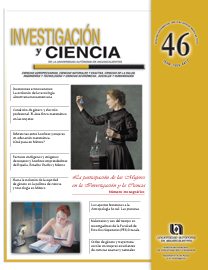Differences between men and women in mathematics education: What happens in Mexico?
Keywords:
Gender, mathematics, mathematics educationAbstract
This article presents an overview of how gender studies play an important role in mathematics education. Research on gender and mathematics has reported significant differences between girls and boys, women and men, in mathematics performance, teaching and learning at different levels of education. In Mexico, this type of studies are still not relevant, which is an important issue to analyze, since in other communities such as Australia, the United States or England these studies have been of interest since the 70's.
Downloads
References
ESPINOSA-GUIA, Claudia, Estado de conocimiento en género y matemáticas: el caso de México (2002-2009). Tesina de especialidad, México: UPN, 70, 2009.
FENNEMA, E., Mathematics learning and the sexes: A review, Journal for Research in Mathematics Education. 5, 126–139,1974.
FENNEMA, E., Women and girls in mathematics equity in mathematics education, Educational Studies in Mathe- matics. 10, 389–401, 1979.
FENNEMA, E. y J., SHERMAN, Sex-related differences in mathematics achievement and related factors: A further study, Journal for Research in Mathematics Education. 9, 189–203, 1978.
FENNEMA, E., et al., Teachers' attributions and beliefs about girls, boys, and mathematics, Educational Stu- dies in Mathematics. 21, 55–65, 1990.
FIGUEIRAS, L., et al., Género y Matemáticas. Madrid: Síntesis, 205, 1990.
FLORES, A., ¿Qué es la Educación Matemática?, Educación Matemática. 3, 67–76, 1991.
GARCÍA, M., Élites discriminadas (sobre el poder de las
mujeres). Barcelona: Ántropos, 254, 1994.
GONZÁLEZ, R.M., Género y Matemáticas: balancean- do la ecuación. México: Porrúa–UPN, 181, 2004.
GÓMEZ-CHACÓN, I., La Tarea Intelectual en Matemáticas Afecto, Meta-afecto y los Sistemas de Creencias, Boletín de la Asociación Matemática Venezolana. 10, 225–247, 2003.
JIMÉNEZ, C., Educación, alta capacidad y género: el necesario compromiso entre los hombres y mujeres más capaces, Revista del ministerio de trabajo y asuntos sociales. 40, 69–82, 2002.
LI, Q., Teachers' Beliefs and Gender Differences in Mathematics, Educational Research. 1, 63-76, 1999.
MORALES, S., Educación media y media superior en México. El perfil de las estudiantes, en: Memoria del seminario Mujer, Ciencia y Tecnología en el Tercer Milenio. México: Secretaría de Gobernación, 29–38, 1999.
PÉREZ, María, Interés por matemáticas en estudiantes de secundaria en relación con variables motivacionales: Un estudio de género. Tesina de especialidad. México: UPN, 38, 2004.
PIATEK-JIMÉNEZ, K., Images of mathematicians: A new perspective on the shortage of women in mathematical careers, ZDM Mathematics Education. 40, 633–643, 2008.
SAÉNZ, Berna, La perspectiva de género y su incidencia en el aprovechamiento matemático. Tesis de maestría. México: UPN-Chihuahua, 135, 2005.
SÁNCHEZ, Nydia, Aprovechamiento en matemáticas en relación con factores motivacionales de tipo cognitivo: un estudio de género. Tesis de licenciatura.
México: UPN, 45, 2003.
SCOTT JOAN, W., El género: una categoría de útil para el análisis histórico, en: M. Lamas El género: la construcción cultural de la diferencia sexual. México: PUEG/ UNAM, 265–302, 1996.
TARTRE, L., y E., FENNEMA, Mathematics achievement and gender: a longitudinal study of selected cognitive and affective variables grades 6-12, Educational Stu- dies in Mathematics. 28, 199–217, 1995.
WALDEGG, G., Procesos de enseñanza y aprendizaje
II. México: Consejo Mexicano de Investigación Educativa, A.C./Fundación SNTE para la Cultura del Maestro Mexicano, 267, 1995.
Downloads
Published
How to Cite
Issue
Section
License

This work is licensed under a Creative Commons Attribution-NonCommercial-ShareAlike 4.0 International License.
Las obras publicadas en versión electrónica de la revista están bajo la licencia Creative Commons Atribución-NoComercial-CompartirIgual 4.0 Internacional (CC BY-NC-SA 4.0)





